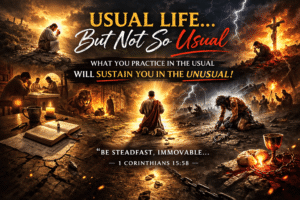
The desire to belong, to find a place of peace and security, is a universal human wish. We all long for someone who cares for us, looks after us, and watches over us. We yearn for a trusted confidant to run to in times of doubt, to ask for advice, and to simply be with. This deep-seated need finds its ultimate fulfillment in our relationship with God.
Often, we don’t realize how much we need the warmth and guidance of this ever-present God. We need a leader, someone to talk to, someone to hear our cries and understand our problems, and a guide to show us the right way. Yet, many times we fail to recognize this presence in our Lord and Savior, Jesus Christ.
His work didn’t end with the ultimate sacrifice on the cross. He is not a historical figure who saved us from sin and then abandoned us. As someone rightly said, “I love the Christ who died for me, but I worship the Christ who rose again from death for me.” The resurrection is our guarantee that Jesus is alive and actively involved in our lives. He is not only our Savior but also our constant companion, eager to listen, guide, and protect you. He is continually watching over you.
But what does it truly mean for God to “watch over” us? We famously memorize the verse from Psalm 121, but do we understand its depth?
The LORD will watch over your coming and going both now and forevermore.
Psalm 121:8 (NIV)
Does this promise mean we will never face problems or that life will always be easy? Let’s look at what the Bible shows us.
In Genesis, we find the heartbreaking scene of Hagar and Ishmael being sent away from Abraham’s camp into the wilderness. Hagar, a mother in despair, watches her son cry from thirst, and she has nothing left to give him. The pain is so great that she cannot bear to watch him die. She places him under a bush and walks away to pray, believing all is lost.
When the water in the skin was gone, she put the boy under one of the bushes. Then she went off and sat down about a bowshot away, for she thought, “I cannot watch the boy die.” And as she sat there, she began to sob. God heard the boy crying…
Genesis 21:15-17 (NIV)
Notice the profound detail here: Hagar said, “I cannot watch,” but God “heard the boy crying.” It was Hagar who cried, but God listened to Ishmael—the very person whose mother said, ‘I can’t watch him.’ At the very moment human ability and hope ended, God’s divine intervention began. In our own lives, we may have situations we have given up on, saying, “I can’t watch over this anymore. I can’t fix this. I am tired.” It is in that moment of surrender that the Lord often picks up the matter in His own hands.
Hagar and Ishmael got tired in the wilderness, but you know they settled in a wilderness only. Abraham was promised that he would be given a land flowing with milk and honey. So this son could expect a land flowing with milk or honey at least, right?
Did God immediately transport them to a land flowing with milk and honey? No. He made them settle in the wilderness. Yet, it was there that God was with Ishmael, and he grew up to become an archer—the first one mentioned in the Bible. In his place of hardship, God didn’t just help him survive; He helped him develop a unique skill and write a new story.
God watching over you doesn’t always mean a dramatic rescue from your trial. Sometimes, it means He will give you the strength, skills, and character to thrive within it.
When Jacob was fleeing from his brother, he had a powerful dream of a ladder to heaven and prayed a simple prayer:
“If God will be with me and will watch over me on this journey I am taking and will give me food to eat and clothes to wear so that I return safely to my father’s household, then the LORD will be my God…”
Genesis 28:20-21 (NIV)
Jacob’s prayer was humble, limited to the bare necessities: protection, food, and clothes. He couldn’t imagine more than that. But God’s plan for “watching over” him was far greater. Despite a deceitful father-in-law who changed his wages ten times and servants who turned against him, Jacob walked away from that land not just with food and clothing, but with such great wealth that it formed two large camps. God’s watchful care exceeded Jacob’s wildest dreams.
This teaches us that even when our prayers are limited by our circumstances, God’s provision is not. His “watching over” means He will accomplish His purposes in your life, often in ways that are more abundant than anything you could ask or imagine.
Finally, the Bible tells us that God is not just watching over people; He is watching over His promises. When God called the prophet Jeremiah, He gave him this powerful assurance:
The LORD said to me, “You have seen correctly, for I am watching to see that my word is fulfilled.”
Jeremiah 1:12 (NIV)
God’s words are not empty or passive. He is actively ensuring that every promise He has spoken will come to pass. In our prayers, we might cry out, “God, have you forgotten your promise?” But the truth is, He is watching over His word more intently than we are. Just as He watched over the words of His prophets like Samuel, ensuring none of them fell to the ground (1 Samuel 3:19), He watches over the promises He has given to you.
So, if your situation feels like a wilderness, remember Ishmael—God is there to equip you. If, like Jacob, your faith can only stretch to cover the basics, remember that God’s plan for you is exceedingly and abundantly more. And if you are tempted to doubt His promises, remember Jeremiah—God is watching over His word to perform it in your life. This is the profound, active, and transformative reality of what it means for God to be watching over you. God’s watching over is constant in the QUIVER OF GOD.



May God bless you all…
So true…. Our thoughts and perspective are often like a bird’s eye view not understanding or limiting God’s bigger picture. It’s rightly written Who can fathom the mind of God…